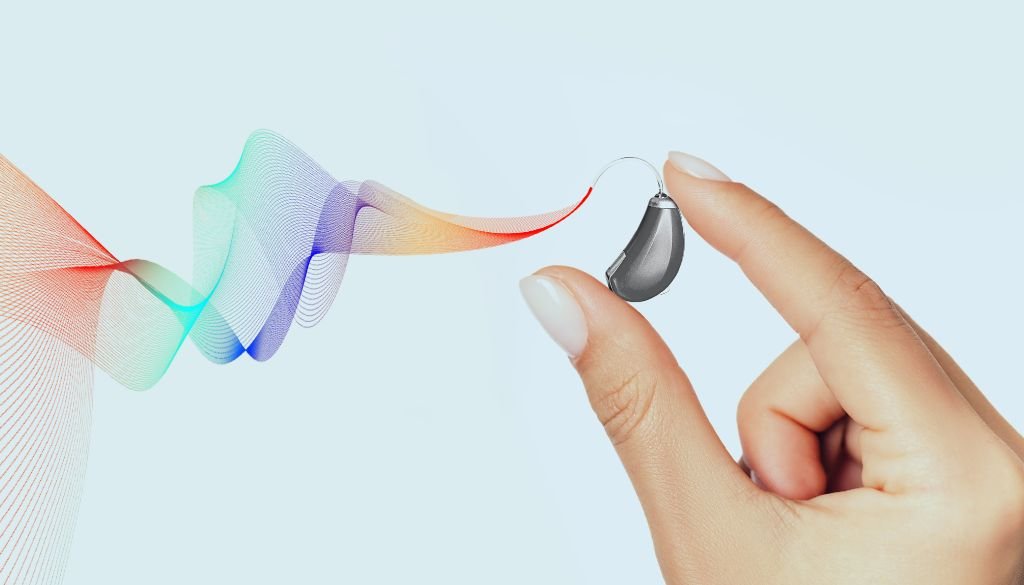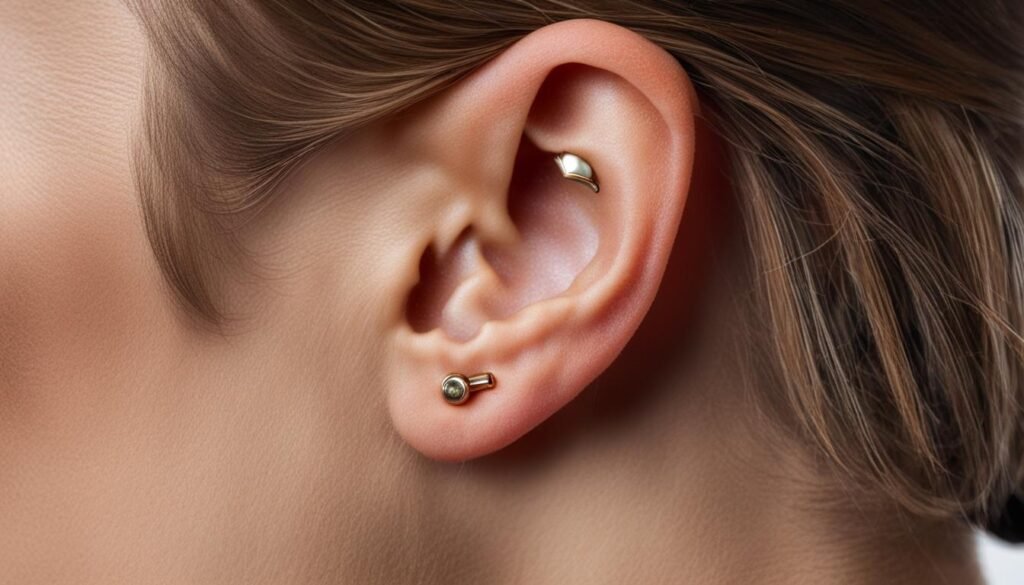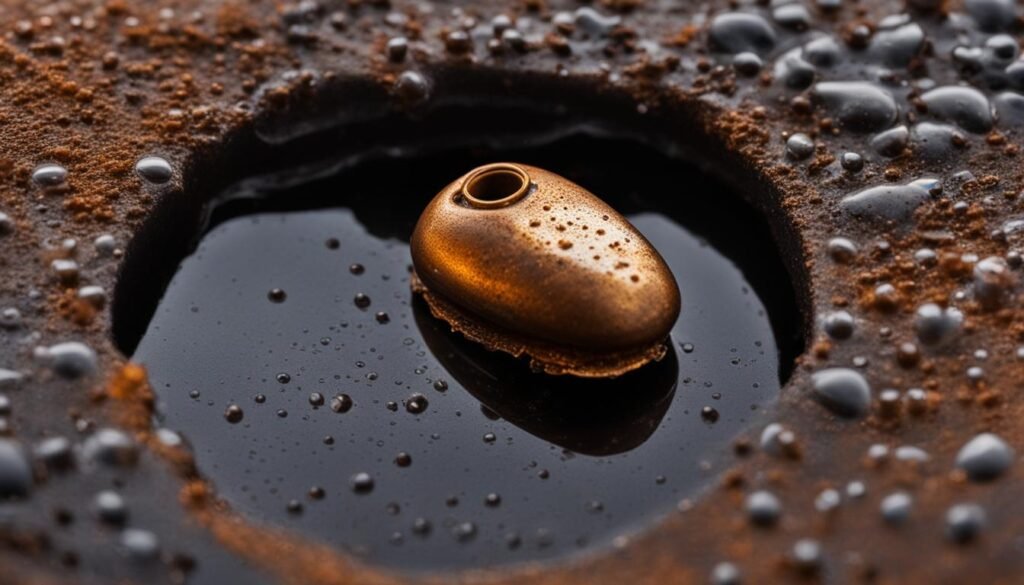“Why Does My Hearing Aid Sound Fuzzy?” If you’re experiencing this issue, know it’s a common problem among hearing aid users. Several potential causes can affect your device’s performance, resulting in a fuzzy or muffled sound. You can identify the root cause and find an appropriate solution by troubleshooting these issues.

One frequent reason for a fuzzy sound in hearing aids is a low battery. A depleting battery can significantly diminish your device’s sound quality and overall performance. Another possible factor is damaged speakers in your hearing aid, which can lead to distorted or unclear audio. Additionally, the cleanliness of your hearing aid plays a crucial role; dirt or debris buildup can significantly affect its functionality. Understanding and addressing these issues is essential for improving the sound quality of your hearing aid.
Key Takeaways:
- A low battery can cause a fuzzy sound in your hearing aid.
- Damaged speakers in your hearing aid may result in distorted sound.
- Cleaning your hearing aid regularly can help improve its performance.
- Addressing these issues can lead to better sound quality and overall satisfaction with your hearing aid.
Earwax Buildup Can Cause Fuzzy Sound in Hearing Aids
Excessive earwax can be one of the main culprits behind a fuzzy sound in your hearing aids. When earwax accumulates in the ear canal, it can create a blockage that interferes with the passage of sound to the ear. As a result, you may experience a muffled or distorted sound quality.
Cleaning your ears properly and removing excess earwax is essential to address this issue. A safe cleaning tool like hydrogen peroxide can help dissolve the wax and clear the blockage. Additionally, it is crucial to clean your hearing aids regularly to prevent wax buildup on the device, which can also affect their performance.
Avoid using cotton swabs or other small objects to clean your ears or hearing aids, as this can push the wax deeper into the ear canal or cause damage to the device. Instead, consult your audiologist or hearing care professional for proper cleaning techniques and tools.
The Impact of Excessive Earwax on Hearing Aids
“Excessive earwax can block the sound from reaching the microphone of your hearing aids, resulting in a fuzzy or muffled sound. It is essential to keep your ears and hearing aids clean to ensure optimal performance.”
By addressing earwax buildup and maintaining proper cleaning routines, you can minimize its impact on your hearing aids and enjoy clear, crisp sound quality.
Improper Fit of the Hearing Aid
If your hearing aid is not fitting correctly in your ear, it can lead to a fuzzy or distorted sound. A poor fit can occur if the speaker portion of the hearing aid does not sit deep enough in the ear or if it slips out of position due to moisture or jaw movement. Realizing that an improper fit can affect your listening experience, addressing this issue promptly is essential.
The Effects of Moisture on Hearing Aid Fit
Moisture can play a significant role in the fit of your hearing aid. Excessive moisture accumulating in the ear canal can cause the hearing aid to slip, resulting in a distorted sound. Additionally, water can affect the device’s retention, making it difficult for the hearing aid to stay securely in place. By ensuring your ears are clean and dry, you can maintain a proper fit and optimize the sound quality of your hearing aid.
Does tinnitus last forever? Discover the intricacies of ‘does tinnitus last forever’ in our thorough exploration, discussing the long-term prognosis of tinnitus.
Solution: Getting a Better-Fitting Hearing Aid
If you’re experiencing an improper fit with your current hearing aid, it may be necessary to explore alternative options. Consulting with a hearing care professional can help you find a hearing aid that fits snugly and comfortably in your ear, ensuring optimal sound quality. A better-fitting hearing aid will provide a more secure fit, preventing slippage and improving your listening experience.
Maintaining a Proper Fit
Keeping your ears clean and dry is essential to maintain a proper fit and prevent a fuzzy or distorted sound in your hearing aid. Regularly clean the device and remove any moisture or debris affecting its performance. Additionally, be mindful of activities that may cause excessive moisture, such as sweating or exposure to humid environments. By taking these measures, you can ensure that your hearing aid fits correctly and provides optimal sound clarity.
Moisture Damage and Wet Hearing Aids
Moisture can be detrimental to hearing aids and result in a fuzzy sound. When hearing aids come into contact with water, such as through sweat or humidity, corrosion can occur in the batteries or within the device’s tubing. This can significantly impact the performance and lifespan of the hearing aid. Taking appropriate measures to prevent moisture damage and ensure optimal functionality is crucial.
To address the moisture issue in hearing aids, removing and drying the devices if they become wet is essential. One effective method is to use a drying kit specifically designed for hearing aids. These kits are equipped with desiccants or dehumidifiers that help remove moisture from the hearing aids, reducing the risk of corrosion and damage. Regularly using a drying kit can help extend the lifespan of your hearing aids and maintain their performance.

In addition to using a drying kit, it is essential to avoid exposing your hearing aids to excessive moisture. This means taking precautions when water is likely to come in contact with the devices, such as during water-based activities or in humid environments. Investing in a protective cover for your hearing aids when participating in such activities can provide an extra layer of defense against moisture damage.
Preventing moisture damage in hearing aids:
- Remove and dry hearing aids if they become wet.
- Use a drying kit specifically designed for hearing aids.
- Avoid exposing hearing aids to excessive moisture.
- Consider using a protective cover during water-based activities or in humid environments.
“Moisture damage is a common issue faced by hearing aid users. By taking proactive steps to prevent moisture-related problems, such as using drying kits and protective covers, individuals can ensure the longevity and optimal performance of their hearing aids.”

By effectively managing moisture exposure and utilizing proper drying methods, individuals can mitigate the risk of damage to their hearing aids and maintain clear sound quality. It is essential to prioritize the maintenance and care of your hearing aids to prevent any potential issues arising from moisture damage.
Adjustments for Face Mask Use and Hearing Aids
Wearing a face mask has become a necessary precaution in today’s world, but it can present challenges for those who wear hearing aids. The ear loops of the show can interfere with the proper placement and function of the hearing aids, leading to a muffled sound. However, there are adjustments and accessories available that can help overcome this issue.
To adjust your hearing aids for mask use, there are a few options to consider. First, you can remove the mask by pulling the cord off the ear in a downward motion rather than pulling it straight off. This helps to reduce the risk of accidentally dislodging the hearing aids. Another option is using a face mask with straps behind the head instead of ear loops. This allows the hearing aids to sit securely in the ear without interference.
Read Also: Why Does My Hearing Aid Keep Cutting Out?
Additionally, there are accessories available that can help keep your hearing aids in place while wearing a face mask. A hearing aid lanyard or a retainer attachment can be attached to the device and secured to your clothing or glasses. This prevents the hearing aids from dislodging or falling out while you adjust or remove your mask. These accessories provide peace of mind and ensure that your hearing aids remain in the correct position for optimal sound quality.
Key Points:
- A face mask can cause a muffled sound in hearing aids due to interference with the ear loops.
- To overcome this issue, adjust the mask by pulling the cord off the ear downward or using a show with straps behind the head.
- Accessories such as hearing aid lanyards or retainer attachments can help secure the hearing aids while wearing a mask.
Troubleshooting Muffled Sound in Modern Hearing Aids
Modern hearing aids are designed to provide clear sound, but sometimes, they can produce a muffled or distorted sound. There are several potential causes for this issue, including earwax accumulation, ear infections, battery problems, and changes in hearing loss. By understanding these factors, you can effectively troubleshoot and resolve the problem.
One common cause of muffled sound in hearing aids is earwax accumulation. When excessive earwax builds up in the ear canal, it can obstruct the microphone’s ability to pick up sound correctly. Regularly cleaning your hearing aids and practicing safe earwax removal techniques can help alleviate this issue. It’s essential to clean the devices thoroughly and remove any wax buildup to ensure optimal performance.
Ear infections can also contribute to a muffled sound in modern hearing aids. Conditions in the ear canal or the middle ear can affect sound transmission and quality, leading to a distorted auditory experience. If you suspect an ear infection, it’s important to seek evaluation and treatment from a medical professional to address the underlying cause of the muffled sound.
Battery issues can also result in muffled sound in hearing aids. If the battery is low or not functioning correctly, it can impact the device’s overall performance. Checking and replacing the battery is crucial for maintaining optimal sound quality. Additionally, changes in hearing loss over time may require adjustments to your hearing aids, such as reprogramming or selecting a different hearing aid model to address the evolving needs of your auditory system.
Overall, troubleshooting muffled sound in modern hearing aids involves addressing common issues such as earwax accumulation, ear infections, battery problems, and changes in hearing loss. By taking prompt and appropriate action, such as cleaning the devices, seeking medical attention for ear infections, and maintaining battery integrity, individuals can enjoy clear and crisp sound from their hearing aids.
The Importance of Prompt Action for Resolving Muffled Sound in Hearing Aids
If you are experiencing a muffled sound in your hearing aid despite troubleshooting, it is crucial to take prompt action. Ignoring the problem can lead to further damage or hearing loss. It is highly advisable to schedule a hearing examination to assess the issue and seek professional help for a proper diagnosis and resolution.
By scheduling a hearing examination, you can gain valuable insights into the underlying cause of the muffled sound and determine the best course of action. Hearing care professionals have the expertise and equipment necessary to evaluate your hearing aids and identify any potential issues thoroughly. Seeking their guidance and recommendations can significantly improve your chances of resolving the problem effectively.
“Taking timely action is essential to prevent further hearing loss and ensure optimal performance of your hearing aids.”
Addressing the muffled sound in your hearing aids promptly is essential for preventing potential damage. The longer you delay seeking professional help, the greater the risk of exacerbating the underlying issue. Early intervention can prevent further deterioration and improve your hearing health and quality of life.
Preventing Further Hearing Loss
When you notice a muffled sound in your hearing aids, it is crucial to prioritize seeking professional help to prevent further hearing loss. Hearing care professionals can offer personalized advice on how to protect your hearing and optimize the performance of your hearing aids.
- They can guide you on cleaning and maintenance techniques to prevent earwax buildup or moisture damage.
- They can recommend suitable hearing aid accessories, such as retainer attachments or lanyards, to ensure secure and comfortable wearing.
- They can also provide insights into lifestyle adjustments, such as finding alternative mask-wearing methods that minimize interference with your hearing aids.
Addressing the muffled sound in your hearing aids, you are taking proactive measures to protect your hearing and enhance your overall communication experience. Don’t take your time seeking professional help and scheduling a hearing examination to address the issue effectively.
Conclusion
When troubleshooting hearing aid sound issues, it is crucial to identify and address the underlying cause promptly. Whether it’s a low battery, earwax buildup, improper fit, moisture damage, or other factors, taking action can help maintain hearing aid performance and prevent further hearing loss.
Regular maintenance and proper cleaning are essential for optimal hearing aid performance. Cleaning excess earwax and drying the device are critical steps to prevent sound distortion. Additionally, seeking professional advice from audiologists or hearing care professionals can guide in resolving persistent challenging issues and ensuring the best hearing aid experience.
Read Also: can viagra cause hearing loss
Remember, by actively troubleshooting and seeking professional advice when needed, individuals can maximize the benefits of their hearing aids and enjoy clear, crisp sound for improved quality of life.
Frequently Asked Questions
Why does my hearing aid sound fuzzy?
Several potential reasons for a fuzzy sound in your hearing aid include a low battery, damaged or dirty speakers, excessive earwax, improper fit, moisture damage, and other factors.
How can I troubleshoot hearing aid issues?
You can troubleshoot hearing aid issues by checking the battery, cleaning the hearing aid and earwax buildup, ensuring a proper fit, addressing moisture damage, and seeking professional advice if necessary.
What should I do with a low battery in my hearing aid?
If your hearing aid has a low battery, replace it with a fresh one to restore optimal performance and sound quality.
How can I clean my hearing aid and remove earwax buildup?
Use a safe cleaning tool like hydrogen peroxide to remove excess earwax from the ear canal. Clean the hearing aid to prevent wax buildup using recommended methods and replace wax guards regularly.
What can I do if my hearing aid doesn’t fit properly?
If your hearing aid doesn’t fit properly, consider getting a better-fitting hearing aid that anchors securely in the ear. Keep your ears clean and dry to maintain a proper fit and optimal sound quality.
How can moisture damage affect my hearing aids?
Moisture can cause corrosion in the batteries and tubing of your hearing aids, leading to a fuzzy sound. Remove and dry wet hearing aids, use a drying kit or dehumidifier, and avoid exposing them to excessive moisture.
Can wearing a face mask interfere with my hearing aids?
Wearing a face mask with ear loops can cause interference with hearing aids, resulting in a muffled sound. Remove the cover by pulling the cord off the ear downward, or use a mask with straps behind the head. Alternatively, secure the device using a hearing aid lanyard or retainer attachment.
What can cause a muffled sound in modern hearing aids?
Possible causes of a muffled sound in modern hearing aids include earwax accumulation, ear infections, battery issues, and changes in hearing loss. Cleaning the hearing aid and seeking professional evaluation may be necessary.
Why is prompt action necessary for resolving muffled sounds in hearing aids?
Ignoring a muffled sound in your hearing aid can lead to further damage or loss of hearing. It is crucial to schedule a hearing examination and seek professional help for proper diagnosis and resolution to prevent additional hearing loss.
How can I maintain optimal hearing aid performance?
Regular maintenance, proper cleaning, and seeking help from audiologists or hearing care professionals when needed are essential for maintaining optimal hearing aid performance and preventing further hearing loss.



